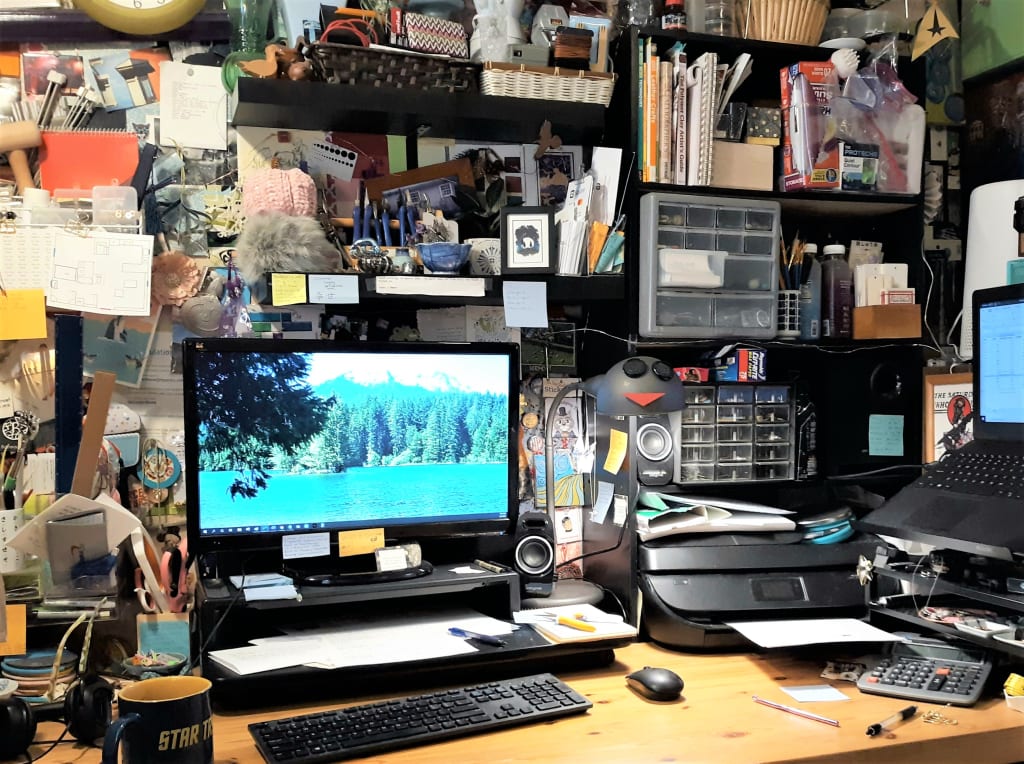An Ode to Messy Desks, Creativity, and Albert Einstein
I'm justifying my cluttered workspace

I could choose to have a clean desk. An uncluttered workspace. But in doing so I would have to give up things. Just as science tells us that no new matter is created or destroyed, anything I do to change my environment just means that things will go somewhere else. I wouldn’t wish this state of things on anyone else.
That doesn’t mean I’m entirely unhappy with my desk, and the deep down, honest truth is that this works for me in many ways, on many levels. Much of it is by choice. Some is not. I’ve written about my lack of space and the desire for just a few more square inches. I live and work in a room that is at once, “a bedroom, a craft boutique, an art studio, an office, and a stockroom,” all in 154 square feet.
Running a craft business and working as a freelance writer doesn’t leave a lot of room for shame, or time to reflect on the desirability of a clean desk. But, it does leave some, so when I saw a photo on Facebook of someone’s clean desk I almost opened the door and let embarrassment in. There’s always been something a little shameful about being messy in society’s eyes. Messy people are lazy and undisciplined. They’re too disorganized to get things done. Messiness is equated with chaos. Neatness, on the other hand, is highly approved of because it’s illustrative of a well-ordered mind. We expect tidiness and neatness in nearly every aspect of society.
Then I remembered that I no longer a single fuck about society’s expectations and that the science behind disorder is on my side. While there are good things that cause and are a result of a clean desk, a messy desk can boost creativity, independent thinking, and insight. In a 2013 study led by Kathleen Vohs, a psychological scientist at eh University of Minnesota, researchers found that,
“Disorderly environments seem to inspire breaking free of tradition, which can produce fresh insights,” Vohs concludes. “Orderly environments, in contrast, encourage convention and playing it safe.”
I’ve rarely been one for playing it safe or abiding by tradition. Just look at my desk.
I also have Albert Einstein on my side. Or would, if he was still alive, I’m sure. Same goes for Samuel Langhorne Clemens – Mark Twain to his fans – and Steve Jobs. The desks of these men regularly make the social media rounds as justification for messy work environments. I leap onto that bandwagon every time it passes.

The thing is, Einstein knew where things were when he needed them. It’s probable that the same holds true for Twain and Jobs. One man’s (or woman's) mess is another’s system of organization. Messy desks didn't hold these people back from being brilliant and creating brilliance.
“If a cluttered desk is a sign of a cluttered mind, of what, then, is an empty desk a sign?” – Albert Einstein
Some of my clutter exists because I have nowhere else to put it. Some of it caters to my need for visual cues. I like seeing things right in front of me, or in spaces that are easy to see. I like the big picture. Some people create vision and inspiration boards. I have an inspiration wall, and I constantly add to it. I like a room and workspace with texture and interest, and there’s always somewhere for a restless eye to rest and be inspired. I’m a maximalist.
The Takeaway
The only real takeaway to all of this is that it doesn’t matter what kind of desk or workspace you have as long as it works for you. I won’t judge your clean and tidy space if you don’t judge my clutter, and that’s the way it should always be.
About the Creator
Maria Shimizu Christensen
Writer living my dreams by day and dreaming up new ones by night
Also, History Major, Senior Accountant, Geek, Fan of cocktails and camping






Comments
There are no comments for this story
Be the first to respond and start the conversation.